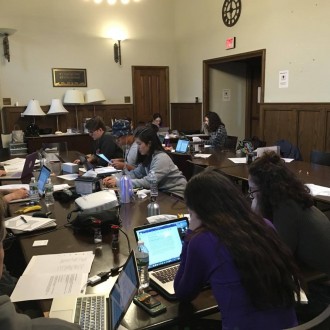This past Saturday, I ventured to Whitman Dining hall for a delicious Saturday Brunch (featuring my favorite breakfast burritos)…but, more importantly, I went to the McGraw Center’s Spring 2016 Hackademics workshop. Hacakademics is a relatively recent initiative that helps Princeton students crowdsource in-depth analyses of the courses offered here. Each participant in the “hackathon” contributes by choosing a course that hasn’t already been documented during previous Hackademics, and analyzing it in-depth to help students who plan to take the course in the future.

The workshop started with Nic Voge, the associate director of McGraw’s Learning Program, giving us an overview of how the hackathon would work. He talked about the need for great course analyses and introduced us to Principedia, the online database of all the course analyses done at past Hackademics. Previously, I thought that the only organized resources we had for choosing classes were the mandatory course evaluations on TigerHub. While those course evaluations are helpful, they frequently present readers with conflicting pieces of undetailed information; I could really see the motivation behind Principedia. Plus, all Hackademics participants got to take lots of cool swag — and they raffled off two coffee machines!
The workshop started with all of us choosing a course to focus on, and analyzing the major goals and ideas outlined in the course. I chose ORF309 (Probability and Stochastic Systems) because I knew it was a class that several people are on the fence about taking. It’s a fantastic class, but the difficulty of the course material pulls many people away from it. Just recently, Dr. Bogucki (Associate Dean, Undergraduate Affairs in the School of Engineering) announced that for the first time, ORF309 will be offered during both the fall and spring semesters next year. Given the burgeoning interest in the class, I thought it would be particularly useful to analyze.
The next step involved writing about how students could best learn from classroom instruction. The questions I tackled included:
- Should I take notes in lecture?
- Are notes posted online helpful for the homework assignments?
- How does precept supplement the lecture material?
- What major concept(s) do the professors want you to learn?
- How can I find a study group for the class?
Answering these questions early in a semester virtually guarantees a better course experience. At Princeton, our classes are already extremely challenging; they can be much harder if you don’t know the right resources to tackle the course material. Finding resources is a little like “learning the system” – the earlier you get the hang of the system, the more rewarding your experience will be.
Finding resources is a little like “learning the system” – the earlier you get the hang of the system, the more rewarding your experience will be.
The third step at Hackademics involved talking about preparing for class assessments (tests, quizzes, papers, etc.), and about which strategy is most effective. For ORF309, I highly recommended that readers go to office hours if they had any questions before the exam – especially if they had questions about past exams. Learning about different approaches to these problems really helps save time on exams (both to find the easiest method of solving the problems and to have a great way to check answers). This sort of advice would have been invaluable to me before I had taken the course – especially during those 50-minute midterms!
The last step involved talking about any external resources that would be helpful for the class (McGraw, other textbooks, etc.), and to give an overall summary of who might want to take the class. I think this last part is particularly important – who would really benefit from the material in this class? Which types of people would find the class interesting and engaging? Every student should ask these questions before they enroll in courses, and Hackademics makes it easier for these questions to be answered.
To answer these questions, I had to really think carefully about what academic strategies helped me most in my classes. Earlier in the semester, I wrote a post about introspective research projects — I think participating in Hackademics was certainly one of them. By carefully analyzing my experiences in a particular class, I was researching the best study methods, tools, and resources needed to succeed in that class. This kind of contribution to Principedia will help others succeed down the road — similar to how reading relevant literature helps researchers succeed in their own projects.
Overall, I had a fantastic time reading and writing course analyses at the Spring 2016 Hackademics workshop. I’m very excited at the prospect that my analysis will be used by several students in the future to make the most out of their classroom experiences. But it was also personally rewarding as I got to refresh my brain with important concepts and tools I had forgotten from last semester. If you’re writing about a class you particularly enjoyed, Hackademics is a fun trip down memory lane!
If you weren’t able to make Hackademics this year, make sure to look out for emails regarding the Fall 2017 hackathon. It’s an awesome experience and a great way for you to help enhance the academic experience for you and all Princeton students. In the meantime, check out Principedia to help with course decisions and enrollment!
— Kavi Jain, Engineering Correspondent

